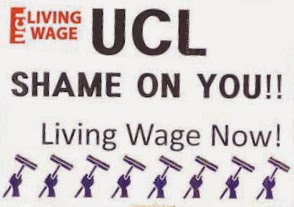Three years to the day after UCL's ethical malpractice first reached the mainstream media, the UCL Living Wage Campaign issues a statement on the current state of affairs.
 All UCL staff, including cleaners, are now paid the London Living Wage. But outsourcing, the root cause of the problem, remains on campus.
All UCL staff, including cleaners, are now paid the London Living Wage. But outsourcing, the root cause of the problem, remains on campus.
On 1 August 2013, UCL finally implemented the London Living Wage (LLW) for all staff. Cleaners, porters and catering staff are now all paid £8.55 or over. But, while poverty pay has been technically eradicated from UCL, the underlying causes (managerialism and privatisation), remain, as well as specific concerns like the underpayment of postgraduate teachers, or overworking of staff.
It has taken almost three years for UCL management to implement the LLW, a pledge made in September 2010 in the face of widespread criticism from the university community and in the media. That commitment was forced from management through a vibrant campaign that brought together students and staff, culminating in extremely negative, but justified, publicity for UCL in the Evening Standard (see also here).
London’s cleaners are some of the most abused workers in the city. Paid poverty wages, they are often unable to live near their workplace. Consequently, many make night bus commutes to work before doing 10-hour days (or more) in 2 or 3 insecure, poorly-paid jobs. It is therefore wonderful news that cleaners at UCL have seen a pay rise of almost 50% over three years. However, this statistic disguises the fact that it is only now that their wages are above the poverty mark. If, in September 2010, UCL accepted that the LLW was the minimum subsistence wage in London, and therefore a minimum moral standard, why did it take three years to implement? We can only assume that the commitment was cynically made.
Money is not a problem. Financially, UCL is one of the wealthiest universities in the country. It:
- made £85million in budget surpluses between 2009 and 2012
- held £290,000,000 in reserves in 2012
- tripled the number of senior staff paid over £100,000 between 2003 and 2012
- increased the Provost’s pay by 75% during Malcolm Grant’s tenure
Meanwhile, UCL’s cleaners spent most of that period on the minimum wage. When they first received small pay rises in 2010, cuts were made to working hours to mitigate the cost. And in 2011, UCL Estates forced through the outsourcing of 100 cleaners and security staff who remained in-house, continuing the very process that had led to the cleaners’ poverty wages.
The twin reasons for this, managerialism and privatisation, remain. The outsourcing (to profit-making private companies) of key service contracts like cleaning drives down wages and conditions, because it introduces another profit margin and a duplicate layer of well-paid managers. These companies remain on campus: Office & General, Chartwells, ISS and CIS, to name just the biggest players. The fight continues.
Still, there is great cause for celebration. The UCL campaign has finally achieved its aim, and outsourced workers across Bloomsbury are fighting back against low pay and abuse. The 3Cosas Campaign at the University of London, for example, has won the LLW and is now campaigning for fair terms and conditions for outsourced staff.
The Campaign will have a stall in the Jeremy Bentham Room at the UCLU Welcome Fair on 26 and 27 September, to distribute this message and talk to new students. If you’d like to volunteer on the stall, our contact details here.

No comments:
Post a Comment